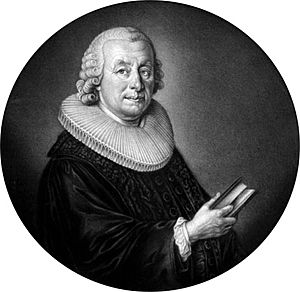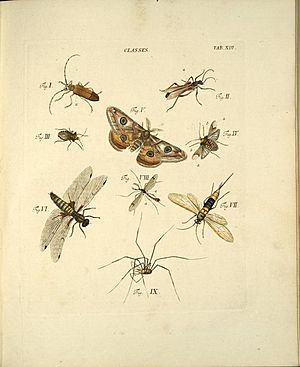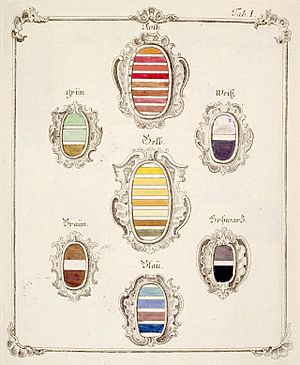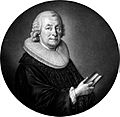Jacob Christian Schäffer facts for kids
Quick facts for kids
Jacob Christian Schäffer
|
|
|---|---|

Jacob Christian Schäffer
|
|
| Born | 31 May 1718 |
| Died | 5 January 1790 (aged 71) |
| Nationality | German |
| Scientific career | |
| Fields | Mycology Entomology Ornithology |
Jacob Christian Schäffer (born May 31, 1718 – died January 5, 1790) was a very smart German scientist and inventor. He was a professor and a church leader (called a dean). He loved studying many things, like plants (botanist), fungi (mycologist), insects (entomologist), and birds (ornithologist). He also created many useful inventions!
Contents
Jacob Schäffer's Early Life and Education
Jacob Christian Schäffer was born in a town called Querfurt in Germany. From 1736 to 1738, he studied Theology at the University of Halle. After his studies, he became a teacher in a city then known as Ratisbon (now Regensburg).
Becoming a Doctor and Church Leader
Schäffer earned important degrees from universities. In 1760, the University of Wittenberg gave him the title of Doctor of Philosophy. Later, in 1763, the University of Tübingen awarded him the title of Doctor of Divinity.
In 1741, he became a pastor, which is a leader in a Protestant church. He continued this work for many years. In 1779, he also became the dean of the Protestant church in Ratisbon. A dean is a senior leader in a church.
Schäffer's Scientific Books and Discoveries
Jacob Schäffer wrote many important books about nature. These books often had beautiful pictures.
Exploring Plants and Their Uses
In 1759, Schäffer published a book called Erleichterte Artzney-Kräuterwissenschaft. This book was a guide for doctors and pharmacists. It explained different plants and how they could be used as medicine.
Studying Fungi and Mushrooms
From 1762 to 1764, Schäffer wrote four books about fungi and mushrooms. These books were called Natürlich ausgemahlten Abbildungen baierischer und pfälzischer Schwämme, welche um Regensburg wachsen. They were full of detailed, colorful pictures of fungi found near Regensburg.
Classifying Birds and Insects
Schäffer was also very interested in birds. In 1774, he wrote Elementa Ornithologica. In this book, he suggested a new way to group birds based on the shape of their legs.
He followed this with Museum Ornithologicum in 1789. This book described the birds he had collected himself.
Schäffer also studied insects. In 1779, he published a three-volume work called Icones insectorum circa ratisbonam indigenorum coloribus naturam referentibus expressae. This huge work had 280 hand-colored pictures of copper engravings. It showed about 3,000 different insects! He later wrote an introduction to insect study, Elementa entomologica, in 1789.
Schäffer's Other Amazing Accomplishments
Jacob Schäffer was not just a scientist; he was also a collector and an inventor.
His Museum and Connections
Schäffer had a large personal collection of interesting objects called the Schaefferianum Museum. He opened it to the public. Even the famous writer Goethe visited it in 1786!
Schäffer was a member of many important scientific groups. These included societies in Göttingen, Mannheim, Saint-Petersburg, London, and Uppsala. He also communicated with famous naturalists like Carl von Linné and René Antoine Ferchault de Réaumur. In 1764, he became a member of the Royal Society in London.
Experiments and Inventions
Schäffer was curious about many things beyond nature. He did experiments with electricity, colors, and how light works (optics). He was known for making prisms and lenses.
He invented an early washing machine! He even published the designs for it in 1767 in a book called Die bequeme und höchstvortheilhafte Waschmaschine. He also invented different types of saws and furnaces.
Schäffer was also interested in making paper. Between 1765 and 1771, he published his findings in Versuche und Muster, ohne alle Lumpen oder doch mit einem geringen Zusatze derselben, Papier zu machen. He showed how to make paper using different plants like poplar, moss, and hop. His work helped paper makers use new materials.
Images for kids
See also
- Category:Taxa named by Jacob Christian Schäffer
- In Spanish: Jacob Christian Schäffer para niños
 | William M. Jackson |
 | Juan E. Gilbert |
 | Neil deGrasse Tyson |






